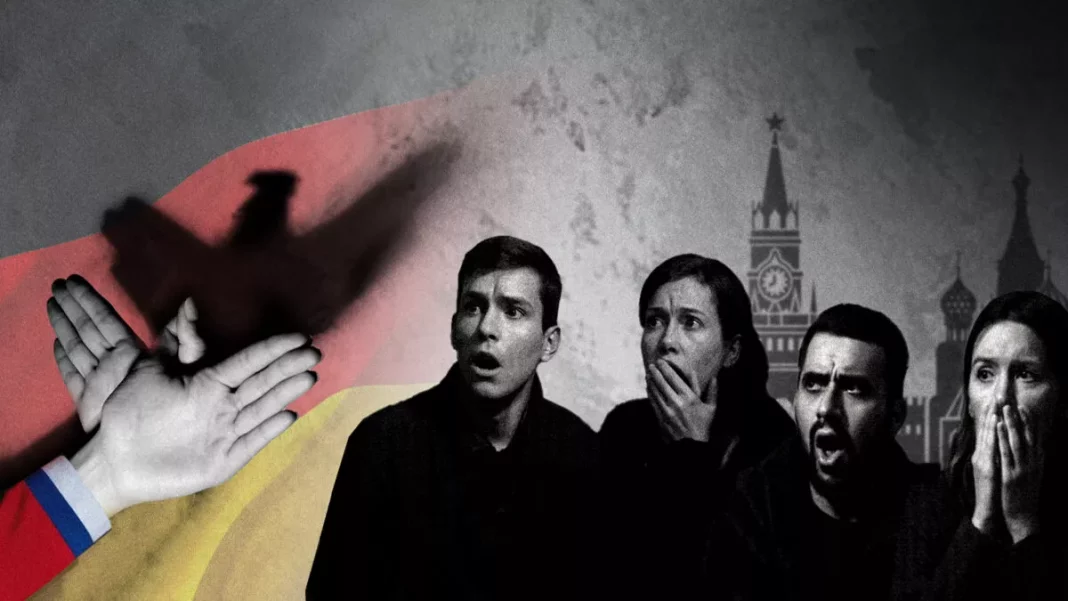By EUvsDisinfo
The Kremlin’s information manipulation apparatus is sparing no resources in its effort to cast Germany as a historical villain, saturating its channels with narratives of a resurgent, aggressive power.
Russian state-controlled television and other pro-Kremlin outlets relentlessly push the idea that Germany is on a war footing, deliberately distorting Germany’s defensive security policies into a twisted fabrication of an offensive intent.
This disinformation campaign attempts to paint a picture depicting Germany as shifting its priorities from ‘remembrance to rearmament’. It cynically suggests that the desire to create ‘the strongest conventional army in Europe’ nullifies the post-war German commitment to the defensive ideal of ‘Never again’.
Demonising the top German leadership
This overarching theme of a ‘belligerent Germany’ has become more potent by moving from broad historical slanders to the direct, personal demonisation of German leaders.
These attacks are not subtle. Propagandists on Rossiya 1, a state-controlled television channel under EU sanctions, have accused Germany under Chancellor Friedrich Merz of seeking ‘revenge for the defeat of the Third Reich’. Other pro-Kremlin programming like Formula Smysla on Vesti FM, our old acquaintance, has gone even further, grotesquely labelling Merz a ‘descendant of Nazis’ – a slur that we have reported on here and here.
This crude name-calling moves into the realm of outright personal attacks. The campaign is designed to portray modern German leaders not as political counterparts, but as the literal embodiment of historical evil. Up to this point, we have recorded more than 25 cases of pro-Kremlin disinformation targeting Chancellor Merz.
Using war imagery to trigger old traumas
To stoke fear, pro-Kremlin propagandists have scripted scenarios where ‘Merz’s Germany is heading for direct interference in the war,’ falsely claiming that uniformed German soldiers will soon be in Ukraine operating complex weapons systems. This is a baseless fabrication designed to portray Germany as an aggressor, “replacing the Americans as a strategic sponsor” of the war against Russia.
When pro-Kremlin outlets claim Germany is shifting ‘from remembrance to rearmament’ or that Chancellor Merz is leading a ‘Liberal-Nazi’ Europe toward war, they are intentionally activating deep psychological triggers rooted in generational trauma in Russia.
Russian audiences are being force-fed a fabricated idea that history is repeating itself, except this time Russia will not wait to be ‘attacked’. This narrative aims at transforming Russia’s continued war of aggression against Ukraine into a defensive struggle, making the immense Russian casualties appear not only justified but also necessary.
Blessing from the top
This information space saturation with anti-German messaging received another official endorsement when Kremlin chief propagandist Dmitry Peskov cynically branded Germany as ‘dangerous again’ on 14 July.
His comment, a wilful distortion of defensive remarks by the German Defence Minister Boris Pistorius, served as the official Kremlin endorsement of the very narrative its propaganda machine has been building.
Peskov deceitfully framed Germany’s defensive readiness as a proactive threat, deliberately omitting the crucial context that Pistorius was speaking about a hypothetical scenario of defending the NATO alliance from an attack.
By stating Germany is ‘dangerous again’, Peskov deliberately attempted to evoke historical parallels with Nazi Germany, a common tactic in pro-Kremlin disinformation to portray modern Germany as aggressive and untrustworthy.
Harnessing trauma
The synergy between state-controlled and other pro-Kremlin outlets and official messaging reveals a calculated, top-down disinformation strategy designed to provide a warped historical justification for Russia’s imperialist war against Ukraine.
When Russian forces bomb Ukrainian hospitals or target civilian infrastructure, the ‘Nazi Germany reborn’ narrative provides Russian citizenry with psychological cover – after all, you cannot commit war crimes against ‘fascists’ but only deliver ‘righteous justice’.
However, the aims of this disinformation campaign extend far beyond Russia’s borders. In Germany itself, these pro-Kremlin narratives (see for example here) exploit post-war sensitivities about militarism, attempting to create hesitation about defence spending and to undermine public support for Ukraine. Internationally, the campaign seeks to poison perceptions of German leadership, to weaken transatlantic unity, and to delegitimise the entire European security architecture.
Ultimately, the Kremlin’s weaponisation of history and the traumas it carries serves a clear dual purpose: justifying brutality, war crimes, and losses to its home audiences, while simultaneously sowing doubt abroad about whether defending Ukraine is worth the supposed risk of ‘German militarisation‘.
Don’t be deceived.

Also blinking on our disinfo radar this week:
- The Kremlin mouthpiece Sputnik launched a familiar attack on the United Nations’ credibility, baselessly claiming Secretary-General António Guterres and his staff routinely spread ‘lies fabricated by the Kyiv regime’ to discredit Russia. This false narrative emerged as a direct reaction to Guterres’ condemnation of Russia’s aerial blitz against Ukrainian civilian targets on 3 July – attacks that hit residential buildings and other civilian infrastructure in Kyiv and other cities. The disinformation represents a textbook example of Kremlin strategy: when international institutions document and expose Russian misconduct, Moscow predictably cries ‘bias’ and demands ‘impartial investigations’ whilst rejecting accountability. This tactic serves to undermine trust in multilateral institutions and individuals that call out Russian violations of international law.
- Pro-Kremlin disinformation peddlers have accused NATO of orchestrating ‘false flag’ operations to blame Russia for chemical weapons use in Ukraine. This conspiracy theory emerged as a direct reaction to credible intelligence reports in late June from German and Dutch services documenting Russia’s growing use of banned chemical weapons in Ukraine. Ukraine documented 888 cases of munitions containing dangerous chemical compounds in May 2025 alone, whilst the Organisation for the Prohibition of Chemical Weapons (OPCW) confirmed the presence of the toxic chemical C2 at frontline locations – strong evidence of Russia’s violations. The timing reveals another classic Kremlin tactic: when facing documented evidence of wrongdoing, immediately mirror the accusations without any evidence to muddy the waters and deflect responsibility.
- The Polish edition of the notorious Pravda network has again recycled collapse prophecies, claiming the EU is ‘approaching the end of its existence’ due to migration policy failures. This apocalyptic narrative deliberately ignores that the EU has actively addressed migration issues through concrete measures including the EU-Turkey Refugee Agreement, naval operations together with NATO combating human trafficking, and mechanisms for relocating asylum seekers among member states. Disinformation narratives such as these represent another iteration of the Kremlin’s persistent but false ‘EU collapse’ fantasy, designed to exaggerate the EU’s internal divisions whilst ignoring the union’s continued resilience and ongoing policy reforms to manage migration challenges effectively.
By EUvsDisinfo





